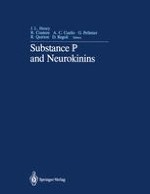1987 | OriginalPaper | Buchkapitel
Tachykinin-Induced Phosphatidylinositol Turnover in Hamster Urinary Bladder
verfasst von : K. J. Watling, N. Suman-Chauhan, D. R. Bristow
Erschienen in: Substance P and Neurokinins
Verlag: Springer New York
Enthalten in: Professional Book Archive
Aktivieren Sie unsere intelligente Suche, um passende Fachinhalte oder Patente zu finden.
Wählen Sie Textabschnitte aus um mit Künstlicher Intelligenz passenden Patente zu finden. powered by
Markieren Sie Textabschnitte, um KI-gestützt weitere passende Inhalte zu finden. powered by
In recent years. substance P and related tachykinins have been shown to stimulate inositol phospholipid hydrolysis in a variety of tissues, including rat salivary gland [1], guinea pig ileum longitudinal muscle and rat hypothalamus [2]. In these tissues substance P, eledoisin and substance P methyl ester possess similar nanomolar potencies at inducing this response suggesting that inositol phospholipid breakdown is associated with SP-P receptor activation [2]. However. in slices of rat ileum longitudinal muscle. eledoisin is considerably more potent than substance P at stimulating inositol phospholipid hydrolysis suggesting that in some tissues this response may be mediated by a SP-E receptor [3]. In order to investigate further the association of SP-E receptors with inositol phospholipid breakdown, we examined tachykinin-induced inositol-l-phosphate production in slices of hamster urinary bladder, a tissue whose contractile response exhibits a typical SP-E receptor profile [4].
